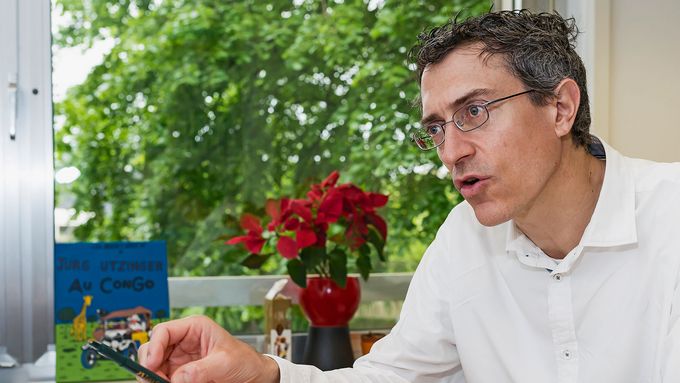“We Want to Be Among the Three Leading Institutions”
Since July 2015, Jürg Utzinger has been the new director of Swiss TPH. During the
interview he stresses four areas he wants to emphasise for the future: structural
development, the mandate, research partnerships and the upcoming challenges
in global health.

What are the structural developments facing the institute?
Here, the motto “Never change a winning horse” is important. This means that we will be continuing to pursue our strategy in a consistent manner, and within the existing structures. Any planned changes will be tackled in a cautious and harmonious way. The change of director has been accompanied by a generational shift in the leadership of the departments. The two research departments are now being led by Nicole Probst-Hensch and Sébastien Gagneux, and Kaspar Wyss now heads the Swiss Centre for International Health, our biggest service department. With these changes in department leadership, the institution leadership conference has also evolved. The directorate now meets every week and is taking on more managerial responsibility within the institute, helping to distribute the burden more widely.
Ever since it was founded, Swiss TPH’s mandate has been to make a contribution to health improvement. What are your focal points here?
Naturally, we will be focusing on continuing this mandate in a consistent approach. As the institute has done ever since it was founded, we will make our contribution to improving public health on a local, national and international level. Here, we base our approach on the three pillars of research, service and education. In 2016, however, we intend to improve the structure of our service offerings in the medical sector. The two existing departments Medical Services and Diagnostics and Medicines Research will be merged to create a single department and should enable us to reinforce the connection between clinical and pharmaceutical research and medical services. This will in turn create synergies with the education and research departments.
01.06.2016 by Christian Heuss
You mentioned partnerships. What is their significance?
They are absolutely essential at all levels, and we will continue to nurture them with care. At the local level, the focus is on our role as an associate institute of the University of Basel. Also important, however, are strategic alliances at the national level, such as with EPFL, the Federal Office of Public Health and the Federal Office for the Environment. Internationally, of course, with our longstanding partners – the Centre Suisse de Recherches Scientifiques in Côte d’Ivoire and the Ifakara Health Institute in Tanzania – and elsewhere in Africa and Asia, where we also have local offices at selected locations. In addition, we also work together with organisations such as the Bill & Melinda Gates Foundation and the Drugs for Neglected Diseases initiative. Partnerships are vital to the institute’s work – without them, Swiss TPH would never have been able to develop into what it is today.
You referred to the challenges of global health as the last area. What exactly do you mean by this?
We are seeing a strong shift in the burden of health problems from infectious diseases to chronic and non-communicable lifestyle diseases, even in the low-income countries of Africa and Asia. This is a huge global challenge. And it is precisely in these areas that we have an excellent position. We can really make a difference here with our expertise and research work, through activities ranging from providing education to implementing services. Our institute has the critical mass and the necessary expertise to tackle these global health problems in an effective way.
Jürg Utzinger, we have spoken about areas of focus. How will the institute develop under your leadership?
I see our institute continuing to function on three levels: research and services with two departments each, and one department for education and training. This will be our approach to fulfilling our mandate. On top of this will of course come our relocation from Basel to Allschwil, which will enable the institute to create a new legal, financial and ultimately also physical foundation. Thanks to the state treaty and the joint financing from the cantons of Basel-Stadt and Basel-Landschaft, we have an excellent basis for the 2017–2020 strategy period. We are extremely grateful to the two cantons and to the federal government for making this step possible. The process of planning, construction and relocation will be a major challenge, not least logistically. But I am certain that we will achieve this with no impact on our efficiency. Our relocation to the modern infrastructure at the Switzerland Innovation Park Basel Area in Allschwil will provide the conditions for establishing a position as a centre of competence for international health. We have set ourselves the goal of becoming one of the three top institutions in this area, not only at the European level but globally as well.
What are the challenges facing the institute?
We enjoy an excellent reputation, both nationally and internationally, and will need to maintain our status in the context of Agenda 2030 and the UN’s new sustainable development goals, for example. We have something to offer in many of the areas involved here, and we aim to establish an optimal position and become a “preferred partner”. One of our great advantages is that we can react rapidly to new challenges without compromising in terms of first-class scientific and ethical standards – we are an “honest broker”, a reliable partner. With us, you know what you get. Cost-cutting measures by the federal government could present a significant challenge. If the parliament reduces its budgets in education and research as well as in development cooperation, this could also affect the institute. We will have to strive, therefore, to maintain our broad base with a good mix of partners and sponsors, not only within Switzerland but also on the European and international levels.